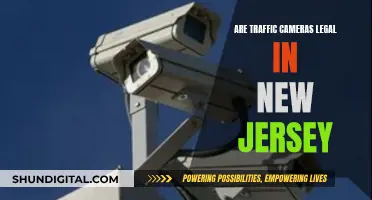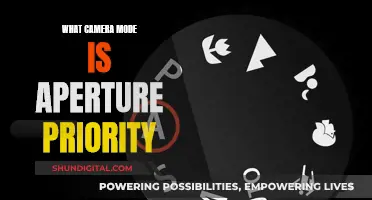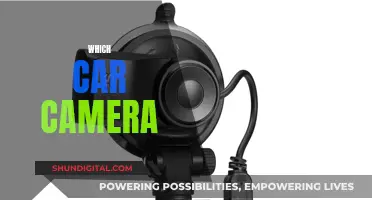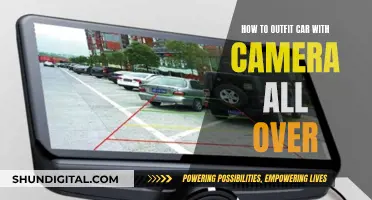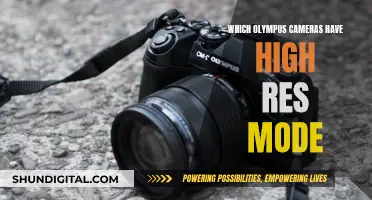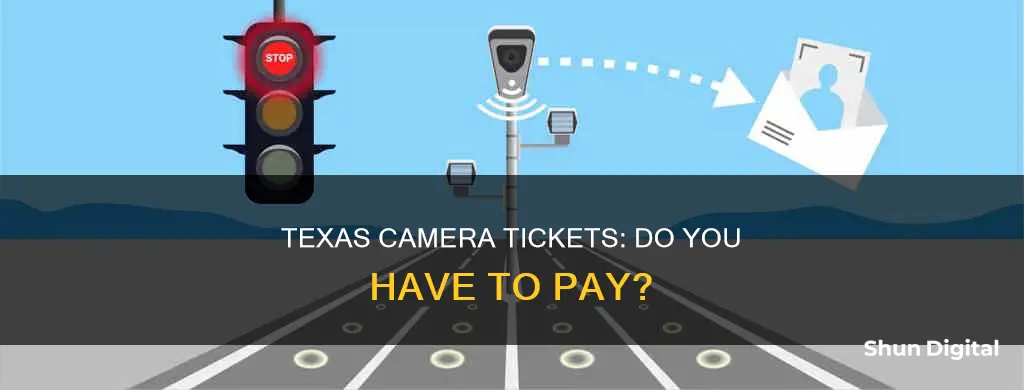
If you've received a camera ticket in Texas, you might be wondering whether you need to pay it. After all, these tickets can be expensive, and there are many reasons why you might not want to pay. The good news is that Texas law prohibits the use of red-light cameras for issuing tickets, and you cannot be arrested or have the violation affect your credit, driving record, or insurance. However, there are still a few cities in Texas with active camera systems, and failing to pay your ticket could result in a scofflaw block, preventing you from registering your vehicle. So, do you have to pay that camera ticket? The answer may depend on where you received the ticket and your personal tolerance for risk.
| Characteristics | Values |
|---|---|
| Do you have to pay a camera ticket in Texas? | No, you don't have to, but it's up to you. |
| What is a camera ticket? | A civil penalty, not a criminal penalty. |
| What happens if you don't pay? | It won't affect your credit score, insurance, or driving record, and an arrest warrant won't be issued. However, it may affect your ability to renew your vehicle registration. |
| What is the fine for? | Running a red light or speeding through an intersection. |
| What is the fine amount? | The civil penalty may not exceed $75, and the late payment penalty may not exceed $25. |
| What happens if you don't pay and it goes to collections? | The Texas Department of Motor Vehicles or your local county assessor may prevent registration of the vehicle, known as a "scofflaw block". |
| Are there any exceptions? | Yes, certain cities were allowed to continue using the cameras until their contracts with vendors expired, including Humble, Amarillo, Leon Valley, and Balcones Heights. |
What You'll Learn

Texas banned red-light cameras in 2019
The Texas Senate passed a bill outlawing red-light cameras across the state in May 2019. On June 1, 2019, Governor Greg Abbott signed House Bill 1631 into law, prohibiting cities from operating photographic traffic camera systems that catch citizens speeding or running red lights and issuing fines. The law came into effect in September 2019.
The bill includes two amendments: one that allows cities to keep red-light cameras until their contracts with vendors expire, and another that prevents local and state officials from blocking drivers with unpaid red-light tickets from renewing their vehicle registration.
There were several reasons for the ban. Firstly, the cameras were found to raise the chances of a rear-end collision due to sudden braking. Secondly, it was argued that the cameras violated people's constitutional rights because they captured an image of the license plate, but not the driver, which goes against the idea that Americans are innocent until proven guilty. Finally, the cameras were expensive to install, and many drivers didn't pay their tickets anyway.
Despite the ban, drivers in Texas may still receive tickets from remaining cameras in certain cities. It is up to each individual to decide whether to pay these fines, but it is recommended to consult a lawyer or legal professional for advice. While there are no direct consequences for not paying, such as an impact on your driving record or insurance costs, there could be other repercussions. For example, your registration for your vehicle may be blocked, or the unpaid debt could be sent to a collection agency.
Understanding Camera's CDS Mode: How It Works
You may want to see also

You don't have to pay a red-light camera ticket
However, it's important to note that some cities in Texas were allowed to continue using these cameras until their existing contracts with vendors expired. These cities include Humble, Balcones Heights, Leon Valley, and Amarillo. If you receive a ticket from one of these cities, it is still technically a violation, and you may choose to pay it to avoid any potential consequences.
Failing to pay a red-light camera ticket in Texas will not result in any legal ramifications. By state law, unpaid tickets cannot be reported on your driving record, and an arrest warrant cannot be issued. Additionally, it will not affect your insurance costs. However, your unpaid fine may be sent to a collection agency, and you may start receiving collection calls. Also, the Texas Department of Motor Vehicles or your local county assessor may refuse to register your vehicle, which is known as a "scofflaw block."
Whether or not you choose to pay a red-light camera ticket in Texas depends on your personal preference and risk tolerance. While there are no legal consequences, you may want to consider the potential hassle of dealing with collection agencies and the possibility of a blocked vehicle registration. It is always a good idea to consult with a lawyer or legal professional for advice specific to your situation.
Speco Cameras: Where Are They Manufactured?
You may want to see also

Not paying won't affect your credit score
In Texas, red light camera tickets are considered civil violations, and while you are not legally obligated to pay them, there are still some consequences for not doing so.
If you receive a red light camera ticket in Texas, it's important to know that you are not legally required to pay it. In fact, according to Texas Transportation Code 707.021, local authorities are prohibited from issuing criminal or civil citations for violations captured by red light cameras. This means that you cannot be arrested or penalized for failing to pay a red light camera ticket.
However, there are still some potential consequences for not paying these tickets. One possible outcome is that the Texas Department of Motor Vehicles or your local county assessor may block the registration of the vehicle involved in the violation. This is known as a "scofflaw block" and can make it difficult to renew your vehicle registration, especially if you try to do so online through the DMV.
Another concern for people who receive red light camera tickets is whether their credit score will be affected. According to Texas law, unpaid red light camera tickets cannot be reported to credit bureaus and cannot impact your credit score. However, there is an exception to this rule. If the city where you received the ticket had a red light camera contract before 2007, they may be grandfathered in and allowed to report unpaid fines to a credit bureau. This means that failing to pay a red light camera ticket in certain cities could result in a lower credit score.
It's worth noting that even if your credit score isn't directly affected by an unpaid red light camera ticket, the fine may eventually be sent to a collection agency. This can result in collection calls and additional hassle.
In conclusion, while not paying a red light camera ticket in Texas won't impact your credit score in most cases, it's important to be aware of the potential consequences, such as scofflaw blocks and collection agency involvement.
Unlocking Square Mode Photography: A Guide to Creative Captures
You may want to see also

It also won't go on your driving record
In Texas, a camera ticket is considered a civil violation, similar to a parking ticket. This means that it will not count against you on your driving record, nor will it increase your insurance costs.
Texas Transportation Code 707.021 states that a local authority is not allowed to issue a criminal or civil citation or charge for a violation that is based on a recorded traffic signal enforcement photo. This means that if you receive a red light camera ticket, you are not legally required to pay it. In fact, some consider paying these tickets to be a "voluntary donation."
However, it's important to note that there may still be some consequences for not paying a camera ticket. For example, your registration for the vehicle involved in the violation may be blocked, and you may receive collections calls. Additionally, certain cities in Texas, including Balcones Heights, Humble, Leon Valley, and Amarillo, may still be able to use camera tickets until their existing contracts with vendors expire.
If you choose not to pay a camera ticket, it's wise to consult with a lawyer or legal professional to understand the potential risks and consequences.
Battery-Powered Wi-Fi Cameras: Night Vision Included?
You may want to see also

However, it may affect your vehicle registration
While you are not legally required to pay a camera ticket in Texas, it may still be a good idea to do so. If you fail to pay your ticket, your vehicle registration may be blocked. This is known as a "scofflaw block".
If you try to renew your registration through the DMV online, your registration will likely be blocked. However, if you go to the county assessor-collector office in person, you may be able to get your registration renewed. It is up to each county to decide whether to enforce a scofflaw block, with some counties choosing not to enforce it as they deem it too time-consuming and costly to force drivers to pay their fines. For example, Tarrant County in Texas does not place a hold on vehicle registrations for outstanding camera tickets.
Therefore, while your vehicle registration may be blocked initially, you may be able to get it renewed by going to the county assessor-collector office in person, depending on the county in which you live.
Camera Tickets: Florida's Legal Viewpoint
You may want to see also
Frequently asked questions
No, you do not have to pay a red light camera ticket in Texas. The Texas Legislature banned the use of photographic traffic enforcement systems in 2019.
If you don't pay your camera ticket, it will be sent to a collection agency, and you may begin receiving collection calls. In some cases, the state's Department of Motor Vehicles or the county assessor may prevent registration of the vehicle that violated the law, known as a "scofflaw block". However, this varies by county, and some counties do not enforce this block.
No, state law prohibits reporting unpaid red light camera tickets to a credit bureau. However, if your ticket was issued before 2007, the city where you received your ticket may report it to a credit bureau.
No, a camera ticket is considered a civil violation and not a criminal penalty. Therefore, an arrest warrant will not be issued if you do not pay.
No, a camera ticket will not be reported to your insurance company or the driver's license bureau, and it will not appear on your driving record.



